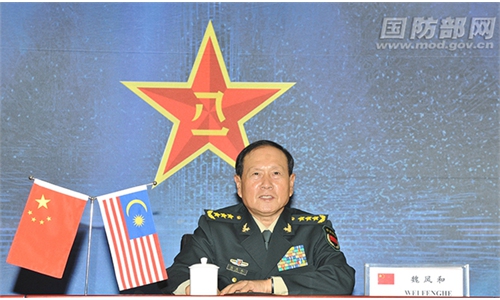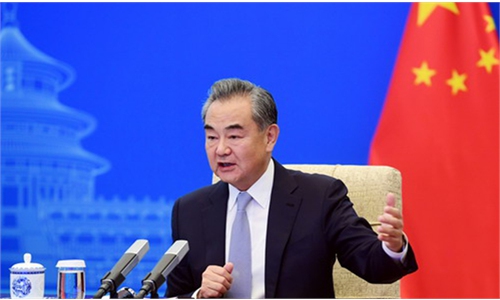US politicians push new bill to sanction China on maritime issue, ‘will receive retaliation if it passes’

Marco Rubio arrives for a Senate Intelligence Committee nomination hearing. Photo: AFP
Some US politicians have pushed another anti-China act to sanction entities and individuals who safeguard China's sovereignty in the South China Sea and East China Sea, the latest attempt by US conservative lawmakers to interrupt the potential recovery of China-US ties and interfere in peaceful solutions between China and other countries on territorial disputes.
According to his personal website, US Republican Senator Marco Rubio said he and Democratic Senator Ben Cardin applauded the Senate Committee on Foreign Relations' passage of their bipartisan South China Sea and East China Sea Sanctions Act.
The legislation would impose sanctions against Chinese individuals and entities that "participate in Beijing's attempts to aggressively assert its expansive maritime and territorial claims over the South and East China Seas," according to the VOA on Wednesday.
Chinese analysts said on Wednesday that some extreme anti-China politicians of the US are trying to find new tricks to create troubles for China-US relationship and this is their latest attempt as the Biden administration is trying to ease the tensions in bilateral ties with China.
But since the midterm elections are near, most lawmakers and Americans voters will focus on domestic affairs rather than international issues, so Congress will be less interested in pushing the legislation advocated by Rubio and Cardin in the Senate and the House, which means the legislation is unlikely to progress, at least in the short term, said the experts.
According to the website of the US Congress, the bill requires the president to "impose property-blocking and visa-denial sanctions on Chinese persons and entities that contribute to development projects" in parts of the South China Sea or East China Sea areas where China has disputes with regional countries. The bill prohibits US entities from investing in or insuring projects involving sanctioned entities in either sea.
"The President must also impose prohibitions and restrictions on correspondent and payable-through accounts related to sanctioned entities… The Department of State must periodically report to Congress identifying countries that recognize China's claims to the contested territories. Certain types of foreign aid may not be provided to such countries," the bill said.
In case if the bill is passed in the Senate and the House, it will truly bring negative impacts to China, especially to those international companies who are interested in civilian projects in the South China Sea or the East China Sea, but it will not shake China's determination to safeguard its national sovereignty, said Lü Xiang, a research fellow at the Chinese Academy of Social Sciences, stressing that China will definitely take countermeasures, such as banning US vessels from using the public goods that China has built in the South China Sea.
Qian Feng, Director of the research department at the National Strategy Institute at Tsinghua University, told the Global Times on Wednesday that this "crazy act" by some US anti-China politicians shows that "these politicians don't even know how to do their jobs without hyping topics about China. In other words, Sinophobia is their livelihood."
In recent years, according to incomplete statistics, a pile of anti-China or China-relevant bills are waiting in the pipeline to be put on the Senate and House agendas, so these kind of tricks have been played frequently among the US circle of politicians, Qian said.
While the Senate Committee on Foreign Relations passed the bill, China-US tensions have shown some signs of cooling down, and this has angered the anti-China force within the US, as they tend to believe the Biden administration is making compromises. "They will strengthen their anti-China moves to make troubles, and it is predictable that politicians like Rubio will 'make more crazy acts' in the future," Qian noted.
Arrogant attempt
Analysts said the bill shows that politicians like Rubio are totally ignorant and arrogant on the relevant issues in Asia, and they might not understand that most regional countries like ASEAN members now prefer to settle their disputes through consultation with China.
Xu Liping, director of the Center for Southeast Asian Studies at the Chinese Academy of Social Sciences in Beijing, told the Global Times on Wednesday that ASEAN is going to hold its summit next month, so the US politicians' move is likely an attempt to use the timing to further spread the "China threat theory" and find new ways to interfere in regional issues.
"But this is another attempt to use US domestic law to interfere in international affairs, and this will not be welcomed by ASEAN members, because regional countries have learned that the US' acts will only intensify, not ease, tensions, and this goes against the interests of ASEAN," Xu said.
Maybe a few countries might want to use the US interference to serve their interests while negotiating with China, but easing tension in the South China Sea has become a consensus in the region. The Code of Conduct negotiations will be pushed forward smoothly despite external interruption, he noted.
The US government has also realized the problem of abusing sanctions. According to Reuters on Tuesday, US President Joe Biden's administration on Monday announced a set of recommendations to revamp its use of economic sanctions to make them a more effective tool of US foreign policy.
US politicians that are addicted to using sanctions to intimidate other countries are extremely ignorant and arrogant. "What makes US politicians believe their country is more supreme, legitimate and qualified than other countries to play the 'judge' to punish others only based on their interests and unilateral views on international affairs?" said a Beijing-based expert on international relations who asked for anonymity.
The US today has abused sanctions to implement their hegemonic policies, and this has exposed that the tools and measures that the US can use are limited. The strength of the US is also declining, so the more sanctions they impose on others, the more isolated the US would be as countries worldwide will try to reduce their reliance and dependence on US-dominated systems, he said.
Following a broad review launched shortly after Biden took office in January, the US Treasury Department unveiled a revised framework intended to take a more surgical approach to sanctions instead of the blunt-force method favored by his predecessor Donald Trump, Reuters reported.
The Treasury warned that countries reducing the use of the US dollar and exposure to the US financial system could erode the effectiveness of sanctions, while digital currencies and other technological innovations also pose a risk to the tool's success, said the report.




